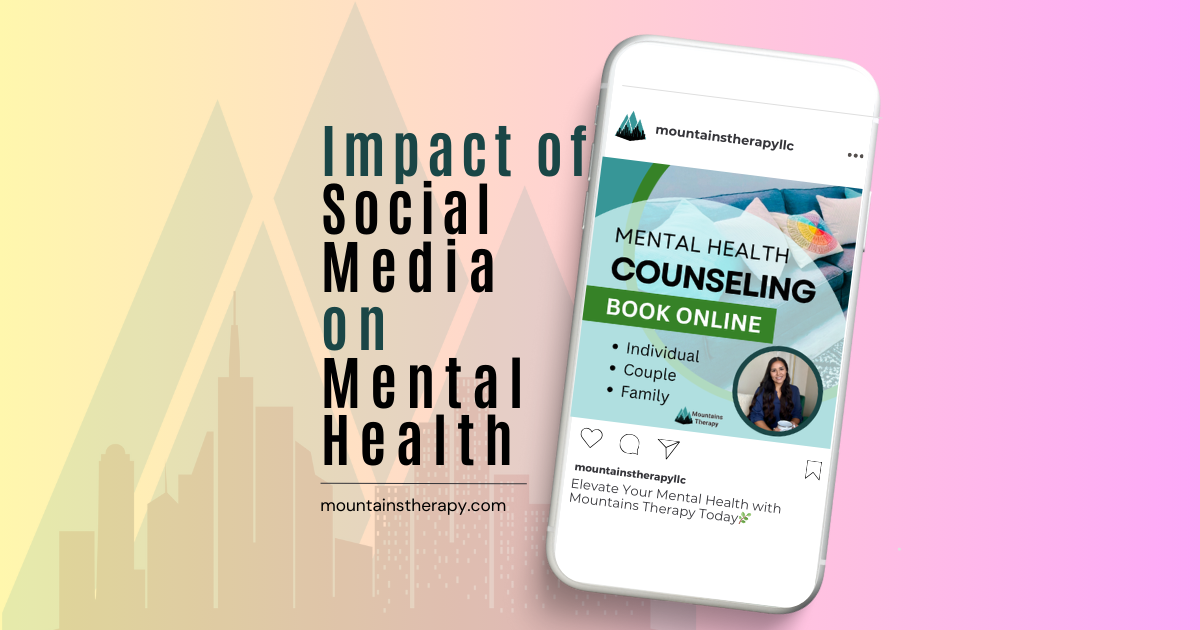The Impact of Social Media on Mental Health
Learn more about Individual Therapy here.
In This Blog, You’ll Learn:
- The positive and negative impacts of social media on mental health
- Strategies for managing social media use to promote better mental well-being
- How Mountains Therapy NJ can support you in navigating mental health challenges in today’s digital age
At Mountains Therapy, we know that in today’s digital world, social media has become an integral part of daily life. Platforms like Instagram, Facebook, TikTok, and Twitter allow people to connect, share experiences, and access information instantly. While social media offers numerous benefits, including fostering connections and providing mental health resources, it also has a profound impact on mental health—both positive and negative.
The Positive Impact of Social Media
Increased Awareness and Support for Mental Health
- Social media has made mental health discussions more mainstream. People openly share their struggles, reducing the stigma surrounding mental illness. Many platforms provide support groups and communities where individuals can connect with others going through similar experiences. This support can be incredibly valuable, especially for those who feel isolated.
Access to Resources
- Users have quick access to a wealth of information about mental health treatments, coping strategies, and professional services. Many therapists, such as those at Mountains Therapy, share content about managing stress, anxiety, and trauma, which can help individuals recognize the need for help and take the first step toward healing.
Building Connections
- Social media allows people to stay connected across long distances, which can combat loneliness. For individuals dealing with mental health issues like depression or anxiety, the ability to maintain relationships online can provide comfort and support.
The Negative Impact of Social Media
Comparison and Self-Esteem Issues
- Social media can trigger a cycle of comparison. People often compare themselves to others’ curated, often unrealistic portrayals of life, which can lead to feelings of inadequacy, poor self-esteem, and even depression. Constant exposure to filtered images and idealized lifestyles can create a distorted sense of reality, affecting one’s self-image.
Cyberbullying and Harassment
- Online platforms can be breeding grounds for bullying and harassment, especially among adolescents. Negative comments, trolling, or targeted attacks can have a significant impact on one’s mental health. Victims of cyberbullying may experience anxiety, depression, and even suicidal thoughts.
Fear of Missing Out (FOMO)
- The need to stay updated on social media can lead to FOMO. When individuals see others participating in activities, attending events, or achieving life milestones, they may feel left out. This constant exposure to others’ lives can lead to increased anxiety, stress, and a sense of inadequacy.
Addiction and Overuse
- Many people feel a compulsion to constantly check their social media accounts, which can become addictive. This overuse can interfere with daily life, productivity, and even sleep patterns, leading to issues like insomnia, anxiety, and feelings of isolation despite the online interactions.
Managing Social Media for Better Mental Health
While the negative impacts of social media are real, there are ways to manage its use to maintain better mental health. Here are some strategies to consider:
1. Set Boundaries
- Limiting screen time can help prevent social media overuse. Setting designated times to check social media or taking occasional “digital detoxes” can reduce anxiety and improve focus on real-world interactions.
2. Curate Your Feed
- Follow accounts that promote positivity, mental health, and well-being. Unfollow or mute accounts that contribute to feelings of inadequacy or trigger negative emotions.
3. Practice Mindfulness
- Be mindful of how you feel before, during, and after using social media. If you notice increased stress or sadness after scrolling through certain platforms, consider limiting your use or seeking support to process those feelings.
4. Seek Professional Help
- If social media is significantly impacting your mental health, it may be time to seek help from a mental health professional. At Mountains Therapy, we offer individual therapy to help clients manage the challenges that come with navigating today’s digital world.
While social media has revolutionized the way we communicate and access information, it can also present challenges to our mental well-being. By setting healthy boundaries, being mindful of our use, and seeking help when needed, we can use these platforms in ways that enhance, rather than harm, our mental health.
Contact Us Today
For more information or to schedule a session, visit Mountains Therapy, and learn how we can help you navigate the complexities of mental health in the digital age.














